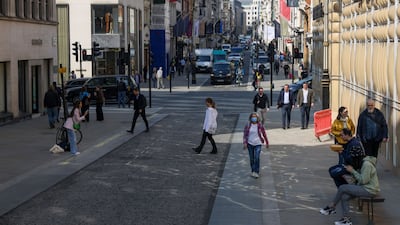Britain’s retail sales slumped in February despite coronavirus restrictions easing, as the cost-of-living crisis started to hit households hard.
The volume of goods sold in stores and online fell 0.3 per cent in February, compared with the same month a year earlier, according to the Office for National Statistics (ONS), after rising 1.9 per cent in January when shoppers made up for lost time following Christmas Covid-19 restrictions.
While some Britons changed their spending patterns as restrictions eased – socialising more and returning to the office – others tightened their belts as the cost-of-living squeeze took hold amid rising energy and fuel bills.
“After a buoyant January, retail sales fell back a little last month,” said ONS deputy director for surveys and economic indicators, Heather Bovill.
“Household goods and many other stores reported a decrease with feedback suggesting February’s stormy weather could have had an impact, while increased travel following the lifting of England’s Plan B restrictions at the end of January drove fuel sales above their pre-pandemic level for the first time.”
Spending also dropped at food stores as more Britons headed to restaurants, while clothing sales picked up as more peopled returned to the office, and the proportion of sales carried out online fell to the lowest since March 2020.
February's retreating retail sales show the pain of higher prices is already hurting, said Susannah Streeter, senior investment and markets analyst, Hargreaves Lansdown.
On Thursday, high street retailer Next said staff shortages, as well as disruption from the war in Ukraine, would fuel an 8 per cent rise in its prices this autumn.
“With the cost of living squeeze intensifying, shoppers have kept a firmer grip on their purses," Ms Streeter said.
“The easing of restrictions did provide some bounce for fashion retailers, as new outfits were purchased for long awaited nights out, but it brought a drop in sales for food retailers, as consumers swapped gourmet meals in for restaurant meals out. With the only way up for prices, with retailers lining up to prepare customers for hikes, it’s likely this drop in sales is the first sign of fresh falls to come.”
Sales excluding fuel fell 0.7 per cent in the month, the ONS said, and more declines in spending may be coming as consumers face a cost-of-living crisis.
That’s mainly driven by looming rises in energy bills that are likely to worsen due to the war in Ukraine, with the government’s fiscal watchdog saying this week Britons face the biggest squeeze on living standards in at least six decades.
A separate survey by GfK showed consumer confidence plummeted for a fourth-straight month in March to its lowest level since November 2020, when the country was under heavy restrictions. Consumers’ outlook for their personal finances fell to the lowest since the financial crisis in 2008.
While Chancellor of the Exchequer Rishi Sunak’s Spring Statement sought to alleviate some of that pain, he has faced criticism for not going far enough to help the most vulnerable.
Mr Sunak was labelled a "fiscal illusionist" by the Institute for Fiscal Studies (IFS) on Thursday for claiming to have cut taxes when he is actually "presiding over a very big increase".
This is largely because of Mr Sunak’s decision to freeze tax thresholds rather than increase them with inflation, meaning more are pushed into higher bands.
Meanwhile, the think tank Resolution Foundation said this means only a tiny proportion will save money from Mr Sunak’s pledge to cut the basic rate by 1 pence before the next general election.
With inflation hitting 6.2 per cent in February, with expectations it will hit double digits this year, almost everybody (92 per cent) has noticed the weekly shop is getting more expensive and while cutbacks are first being made on those nice-to-haves, almost a third of consumers are already cutting back on the things they need, said Danni Hewson, AJ Bell financial analyst.
“Until now, retail sales have proved remarkably resilient, still 3.7 per cent up on where they were back in February 2020," she said.
"But people can’t spend what they don’t have, and that slow creeping erosion of living standards is about to get hit by an energy tsunami.
"Retailers will have to make their own calculations about whether they can absorb the price pressures also assaulting them or to pass them on and hope that won’t totally squash sales volumes.”








